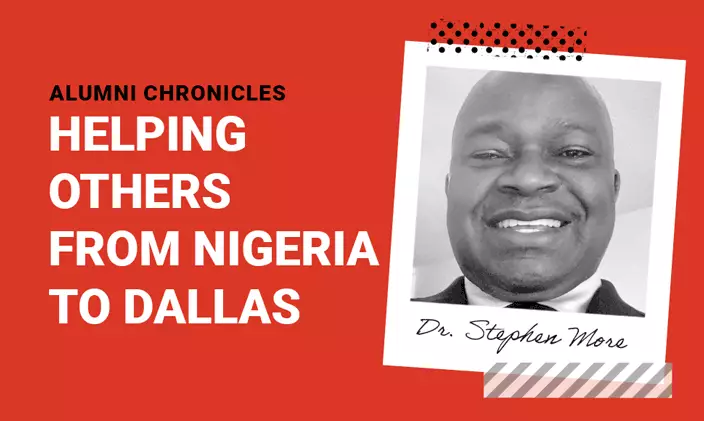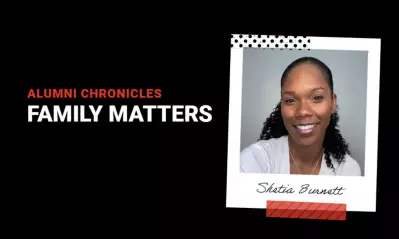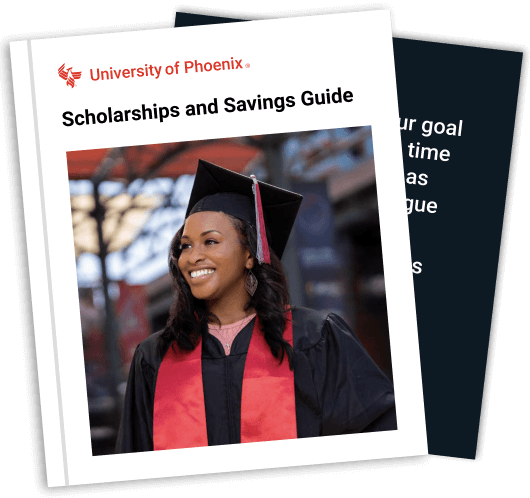Dr. Stephen More: Helping others from Nigeria to Dallas

Written by Michael Feder

It’s not always easy to see how people can come together to tackle big problems, especially in a time fraught with division and conflict. It’s heartening, then, to come across individuals who do not flinch at a challenge but instead face obstacles with fortitude, selflessness and even humor.
Dr. Stephen More has one of those stories.
Born on a rural farm in Nigeria during a civil war, he has relied on his intelligence and compassion to overcome numerous challenges throughout his life. Yet, those experiences haven’t hardened him into a cynic. Instead, they have cultivated in him a positivity that informs the way he views and engages with the world, whether it’s as a nurse on the front lines of the COVID pandemic, a doctoral candidate defending his dissertation or a farmer sharing the fruits of his labor with his community in need.
Humble beginnings
Dr. More was born in a small rural village in Nigeria in 1968 to peasant farmer parents. In addition to being a farmer, his father was a volunteer clergyman in the Anglican Church of Nigeria. He was known to be a peacemaker, and many of Dr. More’s early memories are of his father gathering feuding family members and spouses to make peace between them.
“I learned comfort from my father,” Dr. More says in answer to how his father’s peacemaking affected his own work as a registered nurse on the front lines of the COVID-19 response.
Life on the farm required a lot of work, especially from Dr. More and his siblings. Though they didn’t grow up with a lot of money, Dr. More’s family grew enough crops on the farm to feed themselves as well as to share with others in the village. Whatever they didn’t eat, Dr. More’s family would sell in town.
His mother also prepared fish, salt and soap, which a young Dr. More would hawk around his village.
“My entrepreneurial spirit started there, and it grew with me,” Dr. More recalls.
These efforts produced enough money to pay for the yearly pair of shoes that Dr. More would wear to church and school.
More’s voice picks up a bit when the subject of school comes up. “I loved school,” he says. “Young as I was, I remember I made a vow that whenever I qualified [for school], I [would] stay in school and never leave school again.” Passing this qualification was simple, but something he could not accomplish until he was 7 years old: He had to reach over his head with his right arm and touch his left ear.
After Dr. More successfully completed this test, he was admitted to his local elementary school. He loved every minute of it. He excelled in his studies, even though he had to work on his family’s farm every day after school and on the weekends. Finally, in 1986, he graduated high school as a senior prefect and at the top of his class.
Moving to the big city
Though he achieved his high school diploma, the 18-year-old Dr. More didn’t have the funds to pursue his college education. So, he started working for a steel company in central Nigeria as an electrical hand. His duties entailed sandblasting iron to prepare it for welding into equipment.
From this work, he was able to earn a scholarship for engineering school, where he also graduated near the top of his class. Although he was offered employment at the steel company where he worked, his interests lay elsewhere. He had fallen in love with the metropolitan life he experienced during engineering school in Owerri in southern Nigeria, so he decided to move to Lagos, one the largest cities in the country.
At that point, Dr. More already had enough experience to pursue a fruitful career in engineering. In Lagos, however, he discovered opportunities to put other passions, namely writing and communication, into practice. Over several years, he worked for a newspaper and a television network and published a quarterly magazine. Many of the communication skills that have benefited him in his later career were developed during his time in Lagos.
It was also there that Dr. More became inspired to visit the United States. “I always had a big dream to go to America and further my education,” he says.
Heading to America
In May 2003, Dr. More took the first step toward making his dream a reality and flew to the United States. He lived with friends in Dallas and spent until August exploring the country, visiting places all around the U.S., from Washington, D.C., to New Mexico to Arkansas.
Though his trip was relatively short, he returned to Nigeria with a mission: to return to the U.S. and continue his education. It wouldn’t be easy. The costs associated with studying under a student visa were out of reach, so Dr. More made a plan to work while pursuing his education.
Accordingly, he returned to the U.S. and finished a yearlong nursing program in 2005, which qualified him to work as a vocational nurse. This would form the foundation he needed to advance his education.
He wasn’t just paying for himself, either. Working as a vocational nurse in the period after achieving this degree, he was also sending money home back to his family in Nigeria. He knew that he needed something more.
“Realistically, my decision was that I had to look around for a school that I could do and yet work,” Dr. More says. “That was where University of Phoenix came in.”
University of Phoenix
In 2009, Dr. More enrolled at University of Phoenix’s Dallas campus in the pursuit of a business management degree . The University’s ability to provide him with a quality education that was still within his budget and could be completed around his working schedule was a huge draw for Dr. More.
When asked why he chose a bachelor’s degree in business management, Dr. More recalls his childhood experience selling fish and salt. It was during those early experiences that he understood the importance of having a business sense as well as a strong entrepreneurial drive.
This drive carried him far toward his degree, which he completed in 2013. He went on to pursue a master’s in industrial-organizational psychology from University of Phoenix. Not one to take the easy route, Dr. More simultaneously worked toward this degree as well as a degree to become a registered nurse at another institution and completed both in 2016.
Helping others
Throughout his years in America, Dr. More remained committed to helping those in need while he worked as both a vocational and registered nurse. The work dovetailed with his twin passions of education and compassion, and his degree in psychology represented the intersection of these passions. By 2016, he decided to pursue a doctoral program in industrial-organizational psychology from University of Phoenix.
While working in the U.S., Dr. More underwent another big life transformation: He married and had twin boys. His voice falters slightly when speaking of his wife, who passed away from cancer in the middle of his doctoral program. Her name was Happy, a point that Dr. More takes great pride in emphasizing.
“Of course, my world shut down,” he says, speaking of Happy’s passing. He slowed down in his doctoral program to take care of his children, but even after tragedy he returned to his lifelong passion for education and helping others.
In 2020-21, he worked as a BCFS Health-Krucial front-line RN nurse as part of the COVID-19 pandemic response in Dallas, Mission and Tyler, Texas. Every day, he cared for those affected by the virus, using his background in both nursing and psychology to provide each patient with care. He worked 12-hour shifts, six days a week on the front lines of an uphill and dangerous battle.
Then, on Aug. 28, 2021, Dr. More faced another difficult challenge, although not of the life-or-death variety: He successfully defended his dissertation and earned his doctorate in Industrial-Organizational Psychology.
Asked simply how he mustered the willpower to accomplish this, Dr. More answers: “Lots of prayers.”
When he has time away from work, Dr. More can be found on his Dallas farm, where he has returned to his roots in some ways and raises cattle and some vegetables. Though he raises a good crop, Dr. More mostly gives his produce away for free, sharing it with members of his community.
“Farming is my second love, next to education,” Dr. More says. “I’ll do it to my last breath.”
He still finds time to connect with his home country too, mentoring young entrepreneurs
in Nigeria virtually so they can follow in his footsteps and pursue their passions.
In all, Dr. More cuts an impressive figure. His compassion for others and personal drive reside in equal measure with his humility and sense of humor. As a University of Phoenix alumni, his work has and will continue to touch the lives of those around him in profound ways.

ABOUT THE AUTHOR
A graduate of Johns Hopkins University and its Writing Seminars program and winner of the Stephen A. Dixon Literary Prize, Michael Feder brings an eye for detail and a passion for research to every article he writes. His academic and professional background includes experience in marketing, content development, script writing and SEO. Today, he works as a multimedia specialist at University of Phoenix where he covers a variety of topics ranging from healthcare to IT.
This article has been vetted by University of Phoenix's editorial advisory committee.
Read more about our editorial process.
Read more articles like this:




